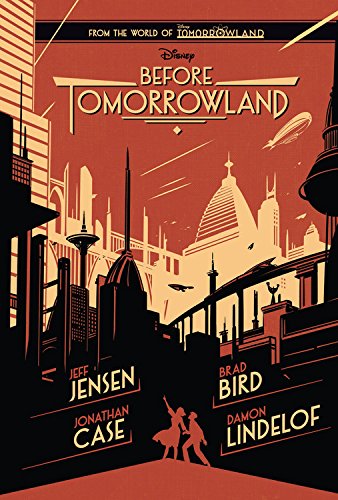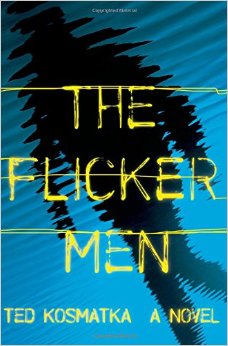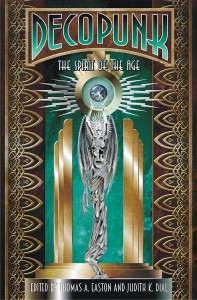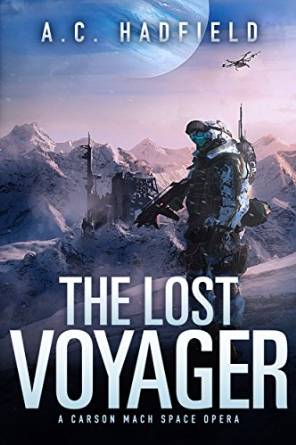 Before Tomorrowland is more or less a prequel to Tomorrrowland, the movie, but you’ll have a hard time matching up the threads between them. Of course, some of them wound up on the cutting room floor, but even so, it’s lacking as a prequel. The action takes place around the first Worldcon and the1939 New York World’s Fair, when a secret society of scientists, the Plus Ultra gang, prepares to unveil the existence of a world of tomorrow, today. Somehow they discovered a fantastic world just a wormhole, or something away, and are keen to build the kind of techno-utopia that science fiction fans have been dreaming of.
Before Tomorrowland is more or less a prequel to Tomorrrowland, the movie, but you’ll have a hard time matching up the threads between them. Of course, some of them wound up on the cutting room floor, but even so, it’s lacking as a prequel. The action takes place around the first Worldcon and the1939 New York World’s Fair, when a secret society of scientists, the Plus Ultra gang, prepares to unveil the existence of a world of tomorrow, today. Somehow they discovered a fantastic world just a wormhole, or something away, and are keen to build the kind of techno-utopia that science fiction fans have been dreaming of.
Only it turns out that those dreams are really just a marketing campaign by Howard Hughes (and pretty much every historical science figure you can name from Tesla to Einstein). There really wasn’t a science fiction golden age, we discover. Instead, we find that it was a vision of the future funded and encouraged by Plus Ultra.
WELCOME: WORLD SCIENCE FICTION CONVENTION. And what a fiction it was. Three men in front of the building wore garish costumes, probably inspired by publications Plus Ultra funded. Henry had files on dozens of magazines, book editors, and press agents, all operating under Plus Ultra’s thumb. Hugo Gernsback, the editor/ publisher of Amazing Stories, was one such honorary member of Plus Ultra, who used his magazines to plant ideas in culture and even, on occasion, recruit innocents.
Jensen, Jeff (2015-04-07). Before Tomorrowland (Digital Picture Book) (Kindle Locations 1015-1019). Disney Book Group. Kindle Edition.
Much to Plus Ultra’s chagrin, instead of a future full of promise and progress, fans insist on one full of alien invaders, mutant hordes and, global apocalypse. But they’re still scanning the crowd for a few dreamers with good hearts and they find two; Clara, a woman who put off chasing her dreams of being an illustrator for too long, now being eaten away by cancer, and her son Lee, who hasn’t really started dreaming yet. Clara’s dragged Lee to New York on the promise of taking him to see Lou Gehrig’s final appearance at Yankee Stadium, but she’s there to go to the first Worldcon in hopes of showing her portfolio to some publishers.
That’s interrupted by the arrival of a robot with the uploaded consciousness of a boy who was horribly burned in an accident working on Amelia Earhart’s rocket plane at the Plus Ultra testing grounds and a bunch of Nazis lead by a renegade Plus Ultra scientist who wants to get the robot body back for himself, and destroy the “good” guys in the process. Yes, you read that all correctly.
The science is outlandish, of course, claiming the mantle of super-science beyond what the years have brought to fruition, except where stealing from today helps the writers out. The writing is either dreadful or brilliantly hyperbolic in what I’m sure is supposed to be a period affectation rather than a failure to hire an actual sciene fiction writer. Cory Doctorow could have made this work, and he probably wouldn’t even have needed the Nazis.
The picture drawn of fandom isn’t pretty, though it’s fairly accurate. In a prescient echo of modern times, there was a faction of fandom barred from entry to the con because they had a social justice agenda for science fiction, while the organizers wanted it to remain free of stuff like that. Ironically, the barred group, the Futurians, don’t appear to have been co-opted by Plus Ultra who had thier own social agenda, but that’s utopia for you. There can be only one, and well, they were kind of far to the left of things.
I was hoping, as I expect Disney still is, that the book (and movie) would give people a way to reconnect to the Tomrrowland vision that’s crumbling in the corner of their theme park…but that’s not going to happen here. That the ending of the book doesn’t quite dovetail with the beginning of the movie is actually a blessing, as the movie comes much closer to getting the job done.
What Disney has missed is that the vision of the future people had in 1939 didn’t need a secret history to be something wonderful. It needed someone who understood it well enough to reveal that wonder to a new generation.




 Before Tomorrowland is more or less a prequel to Tomorrrowland, the movie, but you’ll have a hard time matching up the threads between them. Of course, some of them wound up on the cutting room floor, but even so, it’s lacking as a prequel. The action takes place around the first Worldcon and the1939 New York World’s Fair, when a secret society of scientists, the Plus Ultra gang, prepares to unveil the existence of a world of tomorrow, today. Somehow they discovered a fantastic world just a wormhole, or something away, and are keen to build the kind of techno-utopia that science fiction fans have been dreaming of.
Before Tomorrowland is more or less a prequel to Tomorrrowland, the movie, but you’ll have a hard time matching up the threads between them. Of course, some of them wound up on the cutting room floor, but even so, it’s lacking as a prequel. The action takes place around the first Worldcon and the1939 New York World’s Fair, when a secret society of scientists, the Plus Ultra gang, prepares to unveil the existence of a world of tomorrow, today. Somehow they discovered a fantastic world just a wormhole, or something away, and are keen to build the kind of techno-utopia that science fiction fans have been dreaming of.